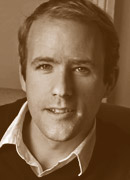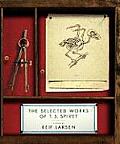Twelve-year-old T.S. Spivet draws maps of train routes and water tables, maps of loneliness, the resilience of memory, even a map of his sister shucking corn. Author Reif Larsen notes, "I think I'm gently expanding the definition of the word
map."
 And about those maps: Larsen, the son of two artists, created them himself. "I got almost all the way through the draft before I realized that we needed to see T.S.'s maps and his diagrams," the novelist explains. "That's the territory of his heart."
And about those maps: Larsen, the son of two artists, created them himself. "I got almost all the way through the draft before I realized that we needed to see T.S.'s maps and his diagrams," the novelist explains. "That's the territory of his heart."
When T.S.'s work is honored by the Smithsonian ? the institute naturally assumes that T.S. is an adult ? he runs away from home in Divide, Montana, and hoboes his way to Washington, D.C. An adventure story, a family saga, and a format-busting beauty (T.S.'s drawings appear on more than half the pages, mostly in sidebars and cutaways alongside the main body of text), The Selected Works of T.S. Spivet is a revelation. "Read it and marvel," Bookpage recommends.
"Here is a book that does the impossible," Stephen King commended. "It combines Mark Twain, Thomas Pynchon, and Little Miss Sunshine. This book is a treasure."
÷ ÷ ÷
 Dave: First, the book is a lot of fun.
Dave: First, the book is a lot of fun.
Reif Larsen: It was fun to write. Waking up every day and writing, I felt like I was along for the ride. Where will it take me next?
Dave: There's mystery and adventure... but on a deeper level it's a novel about mortality, uncertainty, about life. Did the energy of the adventure help you get wrapped up in the story day after day?
Larsen: Very early on, I discovered the voice of T.S. I knew that I wanted to write about cowboys and westerns, and I knew I wanted to tackle it from the point of view of the son of a cowboy. Initially, T.S. was fifty-seven-years-old, narrating from a Parisian prison, drunk. That was going to be a very different book, obviously. But then I realized, No, he's not drunk. He's not in Paris. He's still on the ranch. And he's twelve, actually.
One of the central tensions is that he views the world very differently than his father, who is a nostalgic, cowboy intuitionist. T.S. is a hyper-analytical kid who can't process the world without diagramming it. Once I found that tension and found T.S.'s voice, the novel unfolded. I kept asking, "What's going to happen next?"
The scene in Chicago, when he stabs that crazy preacher guy ? I was totally shocked when that happened. For a couple days, I walked around like a zombie. My girlfriend wondered what was going on, and I'd be saying, "He might have just killed someone."
It was weird, sharing the feeling of discovery that the reader experiences. It's a little different because I was the creator, but the arc of the book had an urgency that was surprising to me. I did a lot of comedy improv in college, and I learned early on as a writer that I needed to build uncertainty into my process, to allow myself room to be surprised in the middle of a sentence. Something crazy comes out, and then you take that to its conclusion. That's how I keep it fresh and don't make myself go crazy.
Dave: False starts must be part of the process for you, then.
Larsen: Yes. It's like throwing paint down. You have to get it down and not edit yourself in the beginning.
A lot of beginning writers are horrified of what they first write. They want to brush away the tracks as quickly as possible. I was like that.
I'm convinced that whatever we write the first time is terrible. It's just a matter of becoming more comfortable knowing that in your second or third or fourth pass you'll clean it up. Put it in now and cut it out later. I had about ten times the number of digressions in the book that I do now.
Dave: I feel like I should ask, in a very serious, Barbara Walters-like tone, "Who is T.S. Spivet?"
Larsen: Who is T.S. Spivet? I don't know.
He's the narrator, he's the protagonist, and yet there's an odd etherealness about him. He floats above everything in some ways. People might want to turn him into the everyman. That's what happened to T.S. in Washington; he got turned into a symbol.
For all the bells and whistles on its surface, the book is a classic novel in many senses. The story has been told many times. It's a road book, a journey book, a coming-of-age book. We're watching T.S. emerge into a form of adolescence or adulthood. He's realizing himself as a player on the stage. All kids go through that. His story is a little more dramatic because he possesses this incredible skill set, spatializing the world, but in important ways he has very similar struggles to other twelve-year-olds.
Twelve is an interesting age. You're starting to gain the vocabulary and symbol recognition of adulthood, but you're still mired within the magical thinking of childhood. It was a very intentional choice on my part to position him as such.
Dave: He can't do anything that his father wants him to. It's actually his deficiencies that set him on the journey. There's that wonderful moment when he thinks his dog is trying to tell him that he's needed on the ranch. And he's surprised.
Larsen: That's really important, too. There's a risk to label him a genius and be done with it, but he is very much twelve. He lacks a real emotional vocabulary, which he starts to gain over the course of the book.
One of my favorite scenes is when he's in the MRI, being scanned, as a child prodigy, and the scientist asks him to perform a really difficult math equation. He's like, "Lady, I haven't even taken pre-algebra."
There's an assumption on adults' part that he can do anything. And it's exactly what you say: It's what he can't do. He might trade in all his mapping abilities to have the same kind of comfort and intuition on the ranch that his father does.
Dave: Take me through you process, step-by-step, creating the book's layout. How were the illustrations and sidebars married to the main body of text? In conception and production, how did that happen?
Larsen: I knew there would be something different about the format ? I had a vague idea of a field guide in my head ? but I wrote the book almost all the way through without any illustrations. I was originally using footnotes for T.S.'s digressions. Footnotes have a long, tangled history in fiction. People use them for a lot of different reasons, but often I find them intrusive.
In writing, I found that in these annotations T.S. showed his weakness; he was most comfortable in the asides. He would make reveals that he wouldn't in the main text. I got almost all the way through the draft befo